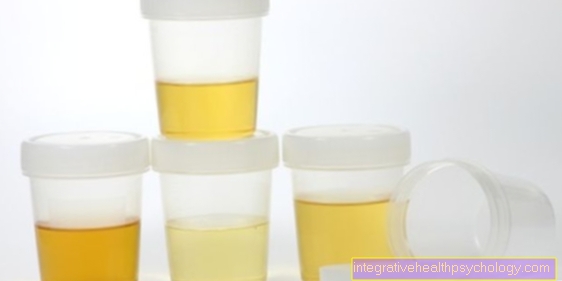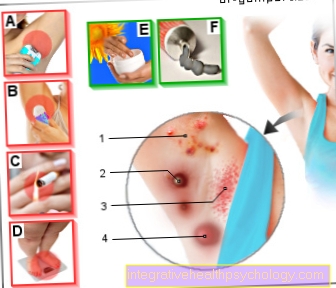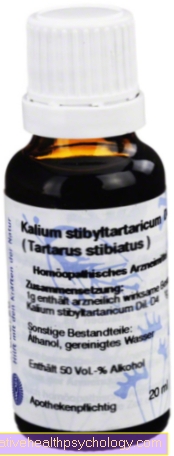Vaginal fungus in pregnancy
definition
Vaginal fungus is the slang term for vaginal mycosis. This disease is a fungal infection of the vaginal lining.
However, the infection can also spread to the external female sexual organ, the vulva. A fungal infection has to be distinguished from the mere colonization with fungi, which does not yet cause symptoms. In 80% of cases of vaginal thrush, the Candida fungus causes the disease. Therefore, besides vaginal mycosis, one also speaks of vaginal candidiasis.
The disease can affect women of any age and can recur several times in a lifetime. Certain circumstances encourage the occurrence of vaginal thrush because they make the body more susceptible to it. Scheidenpillz occurs three times more often in pregnant women than in non-pregnant women, since pregnant women are under a certain hormonal influence that promotes the growth of fungi.
You might also be interested in: Infections in pregnancy

Causes of a yeast infection in pregnancy
A prerequisite for a fungal infection is the pre-existing colonization of the vagina with fungi or re-infection with fungi.
Re-infection is rare and the idea that one "catches" vaginal yeast infections through sexual intercourse is a false myth. In many women, fungi, along with various bacteria, are a completely natural component of the vaginal flora. The naturally existing colonization becomes the vaginal flora The vagina contains microorganisms, mainly lactic acid bacteria, the so-called Döderlein bacteria.
These bacteria do not make you sick, they fulfill an important function. They serve as placeholders and thus prevent dangerous bacteria or fungi from spreading. The lactic acid bacteria curb the growth of other bacteria and also fungi. Another protective factor against fungal infections is, in addition to the colonization with lactic acid bacteria, the acidic environment of the vagina. Fungi do not spread well in acidic environments. The acidic pH value is also achieved by the lactic acid bacteria.
However, especially during pregnancy there are some factors that favor a fungal infection. Pregnancy is a hormone that naturally increases estrogen. Estrogen causes more sugar to be released in the vaginal lining. Unfortunately, the sugar promotes the growth of mushrooms. Also, the pH of the vagina is often less acidic during pregnancy. The acid protection against fungi is unfortunately no longer available.
Fungal infections are more common during pregnancy. This has nothing to do with poor hygiene and the pregnant woman does not have to blame herself for a fungal infection. The infection is mostly due to the fact that the vaginal flora is unbalanced by pregnancy. Usually it is an infection with the yeast Candida albicans.
Read more under: Yeast in the vagina
Diagnosing vaginal yeast infection during pregnancy
The diagnosis is made by asking the doctor about the various symptoms. These include itching, painful urination, painful intercourse, and a whitish-crumbly but odorless discharge.
A vaginal examination will also take place. The vaginal fungus can be recognized optically and, if necessary, confirmed by a smear. The smear can either be evaluated directly under the microscope if the fungi are visible here. Alternatively, the material can also be given to a laboratory. There, the smear secretion is placed on a nutrient medium and after a few days it can be evaluated whether and, if so, which type of fungus is growing there.
Such a smear is also routinely performed on pregnant women a few weeks before the birth, even if they do not have any of the symptoms mentioned above. The aim is to recognize a mere colonization with mushrooms shortly before birth.
Accompanying symptoms of a yeast infection during pregnancy
The characteristic symptoms are intense burning and itching in the area of the vaginal entrance. The skin of the vagina is reddened and covered with whitish, crumbly deposits.
The discharge can be increased and, unlike the bacterial infection, is completely odorless.
It can also be painful when urinating, too Dysuria referred to and painful intercourse that Dyspareunia, occur.
Accompanying symptoms are also swelling and redness of the external genital area. In addition, the mucous membrane can be cracked and stretched. It is also typical that the symptoms slowly get worse and only reach their maximum 3 days after the start. It is also important to know that the symptoms can vary greatly from person to person. For one woman, the itching can be unbearable, while for the other woman, the infection goes almost unnoticed.
Overall, symptoms of the infection do not differ between pregnant and non-pregnant women. Pregnant women may feel weak and impaired more quickly. There is usually no fever because the fungal infection only affects the vagina locally. Although the fungal infection is very unpleasant, it does not pose any serious danger to the mother or the unborn child. Even with the infection, the pregnancy progresses normally and the development of the child is not disturbed by the infection, which is limited to the vagina.
Read more about this at: Symptoms of vaginal thrush
Treatment of vaginal yeast infection during pregnancy
The fungal infection can easily be treated during pregnancy. The infection alone is harmless and does not pose a threat to mother or child, but you want to prevent the vagina from becoming infected with bacteria that could be dangerous to the child.
The fungal infection attacks the mucous membrane and creates entry portals for bacteria. If, in addition to the fungal infection, there is also a bacterial infection, one speaks of a superinfection. Therefore a fungal infection should always be treated.
The therapy has 3 goals: relieving the mother's discomfort, preventing superinfection, the child should be protected from infection during birth.
Various medications are available in the form of suppositories or ointments that can be inserted into the vagina by the person concerned.It is advisable to introduce drugs such as suppositories in the evening so that the active ingredient is well distributed and does not leak prematurely. Therapy is limited to local therapy.
An improvement in the symptoms usually occurs after a few days. Prophylaxis can then be considered. Preparations are suitable for this, which restore the natural vaginal flora as part of a course of several days with lactic acid bacteria.
Some tablet antifungal medicines are not recommended for pregnant women because there are safer alternatives. Therefore, if you get a fungal infection during pregnancy, it is advisable to ask your doctor about a suitable preparation, even if some antifungal agents are over the counter.
You might also be interested in: Fungus treatment and symptoms of vaginal thrush
What medication can I take?
Many women, especially during pregnancy, have great concerns about medication. There is a fear of harming the unborn baby. Caution is also good, but there are safe medications available to treat the fungal infection that are safe to use. Suppositories, creams and gels with the active ingredients clotrimazole, miconazole and nystatin have been tried and tested. If, in addition to the antifungal, i.e. antifungal therapy, pain therapy is also necessary, paracetamol can be used, provided there are no intolerances.
Read more on the topic: Medication during pregnancy, what medications are there for vaginal thrush?
Duration of vaginal yeast infection during pregnancy
If left untreated, the fungal infection can drag on for a few weeks. It can usually be got under control within a few days with antifungal creams or vaginal suppositories. It is important to prevent a relapse even after the symptoms have subsided.
The following rules of conduct will help. Excessive intimate hygiene should be avoided. Washing once a day is sufficient. PH-neutral or slightly acidic washing lotions and skin care creams should be used. In the case of recurring fungal infections, it can help to support the natural vaginal flora by inserting capsules with the good lactic acid bacteria, the so-called Döderlein bacteria, into the vagina.
When should i go to the doctor?
A pregnant woman should see a doctor at the first symptoms. For example, itching and burning, pain when urinating or pain during sexual intercourse or a conspicuous discharge.
Since the fungal infection can spread quickly and become uncomfortable without treatment, you should not hesitate to see a doctor.
Can a vaginal thrush be a sign of pregnancy?
Vaginal fungus occurs much more frequently during pregnancy than in non-pregnant women, but it is by no means a sure sign of pregnancy.
Fungal infections also occur completely independently of a pregnancy, e.g. after antibiotic therapies, with hormonal fluctuations during puberty or with the pill or with immunodeficiency.
Fungal infections indicate that the vaginal flora is out of whack. On the contrary, this can even have an unfavorable effect on the desire to have children. If the vaginal flora is disturbed, the sperm may not be able to survive and advance as well in the vaginal secretion.
What home remedies are there to treat vaginal thrush?
There are numerous home remedies and tips circulating to treat yeast infections. Examples are applications with garlic, tea tree oil, marigold extract, yogurt containing lactic acid bacteria for prophylaxis, hip baths with chamomile tea to relieve symptoms, aloe vera ointments, avoiding sugary foods and many more.
Some home remedies are good and also bring relief to the individual, but do not combat the cause. Other supposedly gentle home remedies, such as vinegar rinses, are far too aggressive and irritate the damaged mucous membrane. It is better to avoid it during pregnancy and otherwise.
Homeopathy in Pregnancy
Pregnancy should not primarily rely on homeopathic therapy for the fungal infection. Successful therapy is essential to prevent transmission to the newborn, whose immune system is not yet fully developed.
If you have good experiences with homeopathy, this can possibly be a supplement. Primarily, however, local fungal therapy with established drugs should be used. For women who suffer from recurring chronic fungal infections, regardless of pregnancy, homeopathy may be of interest if other therapeutic attempts have not been successful.
As part of homeopathic therapy, a very detailed anamnesis, i.e. the medical history, is often taken. This can help to find possible triggers for the recurring infections. On the basis of the medical history, the so-called globules, which are small balls, are then selected. There are many opponents who deny the effectiveness of these globules because they do not contain any classic active ingredient. According to reports, homeopathy has already helped some people. Everyone has to find out for themselves whether the form of therapy is an individual option. However, this should not be experimented with during pregnancy.
You might also be interested in: Homeopathy in Pregnancy
How dangerous can a vaginal yeast infection be for my baby?
A yeast infection during pregnancy is harmless and can be treated well.
It only becomes dangerous if the damaged skin is also infected with bacteria. These bacterial infections can rise and possibly also trigger premature labor and thus premature birth. But that is very rare.
The vaginal fungus itself only harms the child if it is transferred from the mother's skin to the baby during the birth process. The baby's immune system is not yet fully developed and so within the first 4 weeks it can develop so-called oral thrush, a whitish fungal infection of the mouth and diaper rash, irritation of the skin. Both diseases are not particularly threatening for the newborn, but they mean pain and stress for the newborn and can be prevented by treating the mother beforehand.
Can vaginal thrush prevent pregnancy?
The vaginal environment plays an important role in the desire to become pregnant. It should be designed in such a way that the sperm cells are not hindered in their migration towards the cervix and uterus. A fungal infection is usually accompanied by an impaired pH value in the vagina, which is unfavorable for the sperm. In addition, the fungal infection is associated with severe pain during intercourse in most women, which of course also has an unfavorable effect.
However, getting pregnant with a vaginal yeast infection is by no means excluded. If you do not want to have children, you should definitely use contraception. It is important to note that some of the topical antifungal ointments can damage condoms.

.jpg)



























